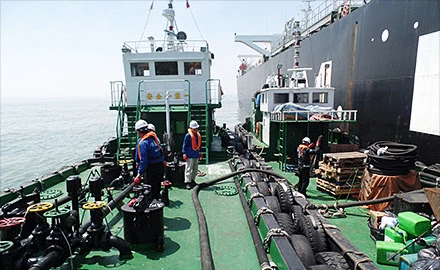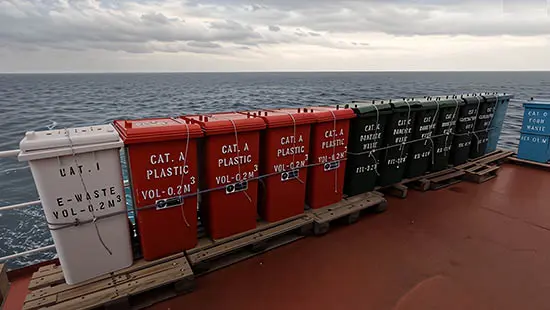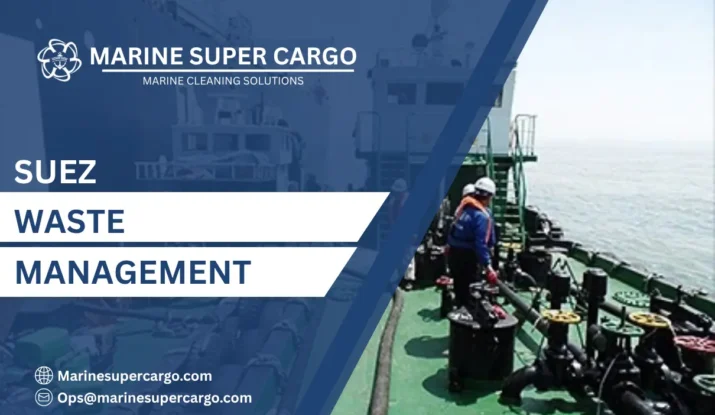Navigating Waste Disposal Requirements at Suez
The Suez Canal represents a critical junction for global maritime trade, where thousands of vessels transit annually. Understanding Suez waste management requirements is mandatory for every vessel operator planning canal passage. At Marine Super Cargo, we specialize in helping maritime operators achieve full compliance with Suez Port Authority regulations while maintaining operational efficiency.
MARPOL Framework for Suez Waste Management
MARPOL establishes the international framework governing maritime waste disposal. The Suez Port Authority implements these standards through local regulations that enhance protection for canal waters. Suez waste management compliance requires understanding both international and regional requirements.
MARPOL Annex V governs garbage management aboard ships. The Suez Canal area prohibits any garbage discharge, requiring vessels to retain all solid waste until berthing at designated ports. Segregation into categories—plastics, food waste, domestic waste, cooking oil, and incinerator ashes—facilitates proper Suez waste management.
MARPOL Annex IV regulates sewage discharge from vessels. Within the canal and its approaches, treated sewage disposal faces strict limitations. Vessels must utilize holding tanks or approved treatment systems meeting IMO standards throughout their transit.
Pre-Arrival Notification Requirements
The Suez Port Authority mandates advance notification of vessel waste quantities before canal entry. This Suez waste management requirement enables authorities to arrange adequate reception capacity at port facilities. Notifications must specify waste types, estimated volumes, and intended disposal locations.
Marine Super Cargo assists vessel operators in preparing compliant pre-arrival documentation. Our expertise in Suez waste management protocols streamlines the notification process, ensuring all required information reaches port authorities promptly and accurately.
-

Essential Suez Port Authority Waste Management Guidelines for Vessels 
Essential Suez Port Authority Waste Management Guidelines for Vessels
Authorized Reception Facilities and Procedures
The Suez Port Authority designates specific facilities for waste reception at Port Said, Suez, and intermediate anchorages. These facilities handle various waste streams according to Suez waste management standards. Vessel operators must verify facility authorization status before arranging waste transfer.
Reception facility procedures follow strict protocols to prevent environmental contamination. Waste transfer operations require supervision by qualified personnel and proper hose connections preventing spills. Documentation of every transfer supports Suez waste management compliance verification during inspections.
Tank Cleaning Waste Disposal at Suez
Tank cleaning operations generate significant waste volumes requiring proper management. Vessels conducting tank cleaning near Suez must arrange advance disposal through authorized facilities. Marine Super Cargo coordinates these services, ensuring compliant waste handling throughout the process.
For additional guidance on tank cleaning best practices, review our comprehensive resources on cargo tank maintenance procedures and environmental protection during cleaning operations.
Penalties and Enforcement Measures
The Suez Port Authority enforces waste management regulations through active monitoring and inspection programs. Violations result in substantial financial penalties, ranging from $5,000 to $100,000 depending on severity. Repeated violations may lead to vessel blacklisting from Egyptian ports.
Port State Control inspections examine waste management records, disposal receipts, and vessel systems during canal transits. Inspectors verify proper segregation practices, adequate storage capacity, and functioning treatment equipment. Deficiencies discovered during inspection delay vessel transit until corrected.
Frequently Asked Questions
Q1: What waste types must be declared before entering Suez Canal waters?
All waste categories including oily bilge water, sludge, cargo residues, sewage, garbage, and tank cleaning residues must be declared 24 hours before arrival using the IMO Advance Notification Form.
Q2: Can vessels discharge any waste while transiting the Suez Canal?
No. All waste discharge is strictly prohibited within the canal. Vessels must retain all wastes aboard until they can transfer to authorized reception facilities at designated ports.
Q3: How long does waste disposal take at Suez reception facilities?
Disposal duration varies by waste type and volume, typically ranging from 2-6 hours. Scheduling advance arrangements with facilities minimizes delay and ensures efficient processing.
Q4: Are there exemptions from Suez waste management requirements for small vessels?
No exemptions exist based on vessel size. All ships transiting the canal must comply with waste management regulations regardless of tonnage, though smaller volumes may simplify procedures.
Q5: What documentation must vessels retain after waste disposal at Suez?
Vessels must maintain waste reception receipts, Oil Record Book entries, Garbage Record Book entries, and all correspondence with reception facilities for Port State Control inspection.
For expert assistance with Suez waste management compliance and tank cleaning operations, contact Marine Super Cargo today.


